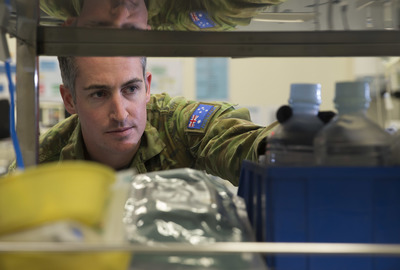A Day in the Life of Royal Australian Navy officer, Lieutenant Commander Thomas Miller, a Nurse Educator

Lieutenant Commander Thomas Miller is the Nurse Educator in the Royal Australian Navy. His career has seen him deployed around the world including Fiji, Papua New Guinea, East-Timor, Afghanistan and Iraq, and most recently to Operation Bushfire Assist, helping locals amidst the emergency at home. His work ensures that nursing staff are trained and supported to become expert military clinicians.
05:30 I start each day with a run before work.
07:00 My work begins at the Royal North Shore Hospital. Our staff are trained here to ensure we advance and maintain their skills in a major trauma centre. Today I’m responsible for around 40 clinicians. They are highly qualified nurses and medics. It is my job to help enhance their professional capability and mentor them for military experience. They will have unique opportunities and exposure to areas of the Australian Defence Force (ADF), whether that is going to sea or getting an idea of tactical and operational areas of focus. It’s a lot to learn and I help ready them to be top of their game!
In the emergency department, I brief my team and the hospital educators on the floor about what I expect of my members that day. They work throughout all areas of the hospital, including resuscitation, intensive care, acute care, mental health and paediatric emergency. It’s my responsibility to make sure everyone is informed and comfortable in their daily tasks.
09:00 I make my way through the hospital and touch base with everyone throughout the morning, to ensure they are getting the most out of their clinical duty. It’s important that our nursing officers have as much experience as possible in an emergency setting, preparing them for high-pressure situations. I want to ensure that when our staff deploy, they have the best possible clinical experience to provide to the ADF and the civilians we may look after.
10:30 The rest of my morning is spent on some micro-clinical skills with members. I explain how we do things a little differently in a military setting, teaching them some tips and tricks to apply when they are deployed. For example, it might be a technical explanation of how to run a specific infusion on a patient, and then putting that into a military context where the resources are different. I use my 12 years of experience as a military nurse to provide context and ensure our workforce come out the very best that they can be. My focus is on teamwork and building trust. In my experience, what’s been most important is knowing that I have people around me looking out for me so I can look after others.
13:00 After lunch I head back to base, HMAS Penguin. I prepare for clinical simulation training with the Maritime Operational Health Unit and other fleet-based nurses. This involves training within a controlled environment, where we can replicate medical emergencies and scenarios to best train our clinicians for real events, to maintain preparedness. We spend the afternoon replicating medical emergencies within our simulations centre, which looks like a mock-up military hospital. It’s a controlled environment that replicates the real environment we may go into in the future, putting theory into practice as close as possible. I’ve been in positions where my training and skills have led to actions that have relieved great distress, and I wouldn’t have had the same opportunities were I not in the ADF, so it’s really useful to be able to explain these unique types of scenarios in the Unit.
15:00 I take some calls with staff that are placed with ambulance services. Today, some are placed with helicopter retrieval teams. I’m a firm believer that people need a safe mentor that won’t judge them and will support them in making the correct decisions. It’s good for them to have someone to call to make sure they’re making the right decision, to guide and prepare them for deployment.

I need to be able to hand over my nurse educator role at short notice and be ready for deployment. Most recently this was on Operation Bushfire Assist, when overnight I found myself on a ship sailing to the outlying towns of southern NSW, where no-one was able to get in or out. That deployment meant a lot to me because it was close to home. I have the ability to care for people in their day of need, possibly even on the worst day of their life, and being in the military adds another dimension to that.

16:00 I have some members that are fully qualified nursing officers, but are upskilling in Masters Programs. I spend an hour with them catching up, making sure they are supported. The Navy really invests in people, and I get great satisfaction from hearing about what they’re learning in their specialist areas. They’re exceptionally qualified clinicians.
17:00 I head home for some R&R.
19:00 Tonight I’m meeting some of my team for a social dinner* in Mosman. There is no other organisation in the world that has the same mateship and support as the ADF. I’ve made some brilliant friends.
*Adhering to current physical distancing rules.
A Day in the Life of a health equity consultant and street health nurse
Adjunct Associate Professor Sonia Martin is a health equity consultant and street health nurse,...
Nurse turns to teaching health care's next generation
Rosemarie Garcia has returned to where her nursing training began, this time as a teacher to the...
Nurse-led regional clinics pilot shows promise
A pilot program that saw over 25 nurses deliver chronic disease management and preventative...




![[New Zealand] Transform from Security Awareness to a Security Culture: A Vital Shift for SMB Healthcare — Webinar](https://d1v1e13ebw3o15.cloudfront.net/data/89856/wfmedia_thumb/..jpg)
![[Australia] Transform from Security Awareness to a Security Culture: A Vital Shift for SMB Healthcare — Webinar](https://d1v1e13ebw3o15.cloudfront.net/data/89855/wfmedia_thumb/..jpg)




